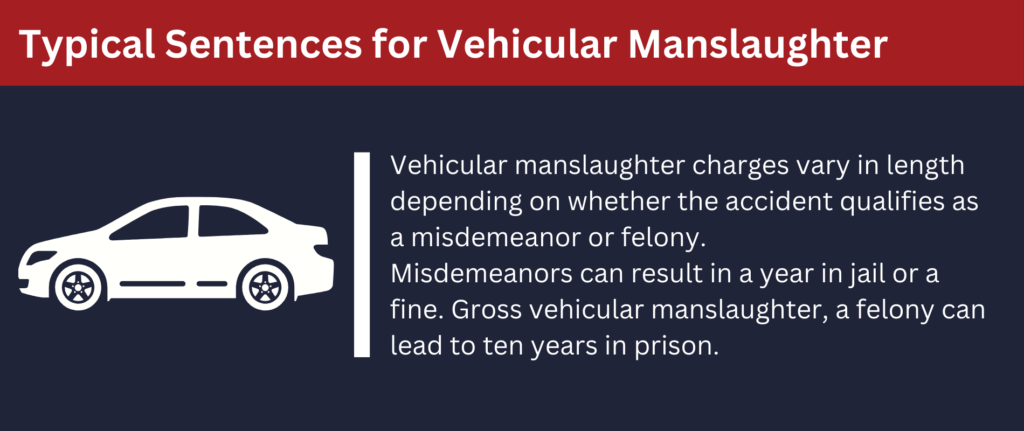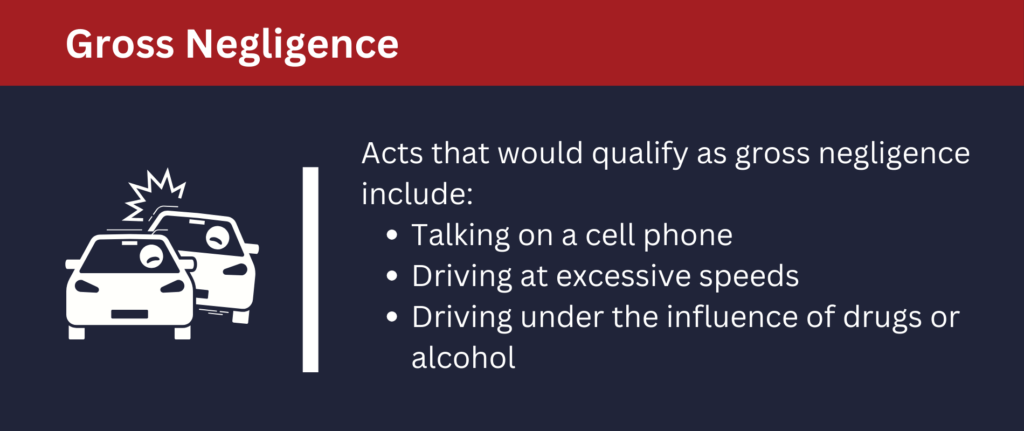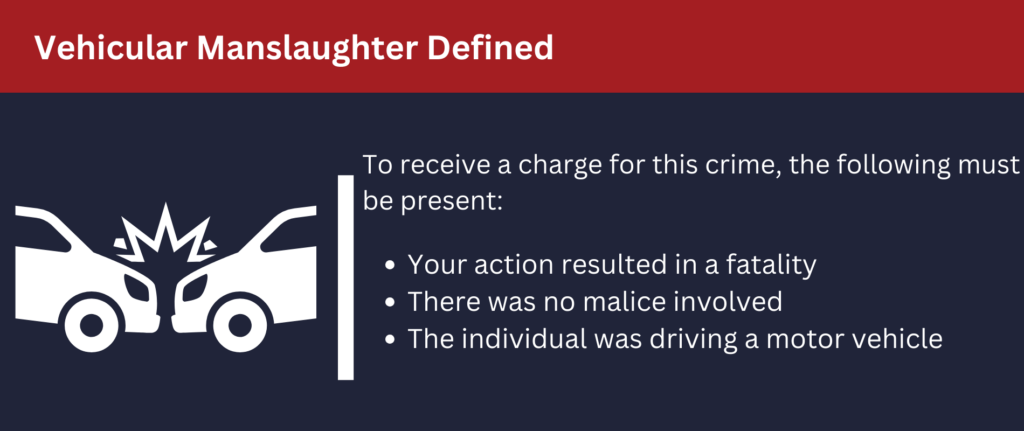
The sentence for committing vehicular manslaughter is usually somewhere between one year if it’s deemed a misdemeanor and up to six years if it’s a felony. Your sentence may vary depending on the extent of negligence involved in the crime.
For an in-depth explanation of vehicular manslaughter, how sentencing works and how to prevent being charged, check out our full guide below.
Vehicular Manslaughter Defined
California Penal Code 192(C) defines vehicular manslaughter as driving a vehicle in an unlawful or negligent manner that causes the death of another individual. To receive a charge for this crime, the following must be present:
- The killing of another person in an unlawful manner
- There was no malice involved
- The individual was driving a motor vehicle
While both manslaughter and murder results in the death of another human, the former results in a lesser charge. There are several factors which distinguish these two acts.
In contrast to murder, manslaughter is causing the death of another person due to any of the following conditions:
- The person acted in the heat of the moment or passion.
- The individual was acting in “perceived” self-defense, but it was found unreasonable that they should need to use self-defense.
- The person never intended to kill someone but acted recklessly or negligently.
Vehicular manslaughter simply covers a scenario where someone dies at the hands of someone driving a vehicle with negligence. Common causes of vehicular manslaughter include distracted driving and driving under the influence.
Typical Sentences for Vehicular Manslaughter

Vehicular manslaughter charges vary depending on whether they qualify as a misdemeanor or a felony. If the person was driving unlawfully but not to the degree that a felony is charged, they could receive a year in jail or a fine.
If someone is charged with a felony, it’s referred to as gross vehicular manslaughter. The maximum sentence for this type of charge is ten years.
In some instances, fatal vehicular accidents can qualify as murder. For example, if the prosecutor has reason to believe the person had malice or animosity towards the victim, the case could be classified as murder.
Negligent Conduct Vs. Intentional Conduct
When someone uses their vehicle as a deadly weapon, the penal code changes to Code 187 PC murder. It doesn’t matter if the vehicle was the instrument causing death. The main differentiator is the person’s intent.
Negligent conduct that may arise to the level of vehicular manslaughter involves these qualifiers:
The defendant knew or should have known their conduct was dangerous, and the conduct does not constitute the intention of harming anyone.
No Negligence Vs. Ordinary Negligence Vs. Gross Negligence
Every case of vehicular manslaughter involves a level of negligence. If the driver in a fatal accident acted lawfully without negligence, there is no crime — even though someone died.
For example, if someone runs in front of your car and you had no reasonable time to react, there wouldn’t be any negligence involved. If you had time to react and were distracted due to unlawful activity, however, a level of negligence would be present and you’d be legally responsible.
But the degree of negligence present has an impact on your sentencing.
Ordinary Negligence
If you were simply acting careless, being inattentive or committing an error in judgment that resulted in death, you’d likely be guilty of ordinary negligence.
Ordinary negligence is a misdemeanor, for which the maximum PC 192(C) sentence is one year in county jail. You may also face fines of up to $1,000.
Gross Negligence

Gross negligence, on the other hand, involves conduct that a reasonable person would understand as more serious and expect a high risk of death or great bodily injury.
Acts that would qualify as gross negligence includes:
- Talking on a cell phone
- Driving at excessive speeds
- Driving under the influence of drugs or alcohol
Vehicular manslaughter as a result of gross negligence is a wobbler. This may qualify as a misdemeanor or a felony, depending on the circumstances.
Felony charges could result in fines of up to $10,000 or a prison sentence of two, four or six years.
How Can I Prevent a Vehicular Manslaughter Sentence?
If you’re involved in a vehicular manslaughter case, it’s possible to get your charges dropped or negotiate a lower sentence with the help of a lawyer. For example, you might be able to negotiate a felony charge down to a misdemeanor if you can prove you were driving responsibly, did not break additional laws and only ordinary negligence was present.
If you can’t minimize your felony charge , it’s still possible to argue that a period of probation would be a better punishment. The effectiveness of this argument will vary based on the facts of the incident and your prior criminal record.
In the best case scenario, our lawyers will prove no negligence was present on your part of the accident. If successful, this argument could dismiss you of all charges.
Contact a Car Accident Attorney Today
A vehicular manslaughter charge is serious. If you’ve been involved in a fatal car accident, it’s important to have a lawyer by your side. For a free case consultation, call us anytime at (800) 718-4658.


